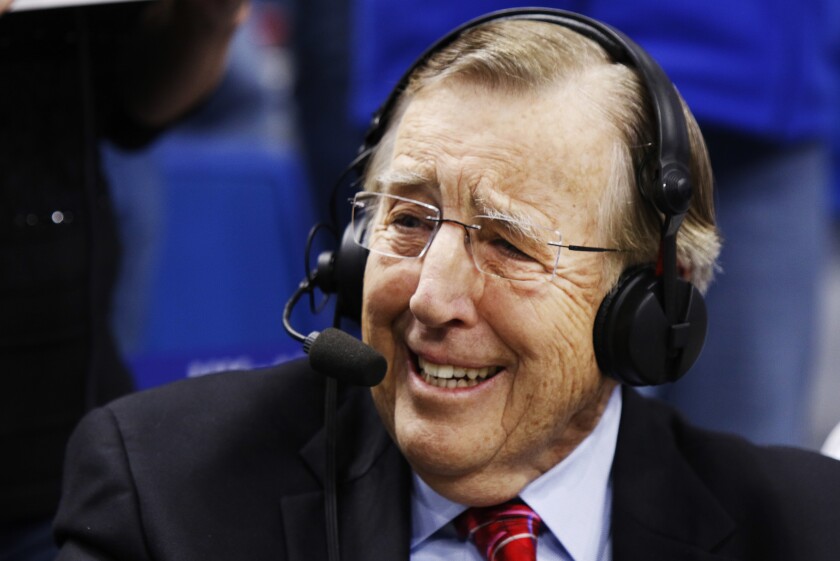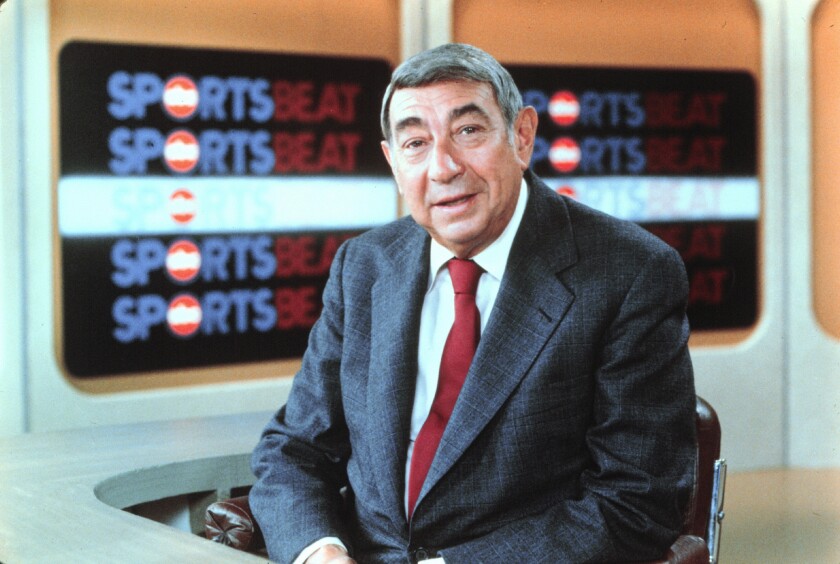Inside ‘Winning Time’s’ era of eye-popping debauchery in sports TV
When new owner Jerry Buss won his first NBA title with the Los Angeles Lakers on May 16, 1980 — the moment Season 1 of HBO’s “Winning Time” is driving toward — most of the country could see it only on tape delay, after late local news. After all, it was May sweeps, when advertising rates are established, and CBS understood that even a decisive Game 6 pitting the Lakers against the Philadelphia 76ers was no match, in the ratings race, for “The Incredible Hulk,” “Dukes of Hazzard,” and “Dallas.”
Reruns of “The Incredible Hulk,” “Dukes of Hazzard,” and “Dallas.”
In an era when cable was in its infancy and just three networks attracted the vast majority of American viewers, NBA ratings routinely earned single digits when a 20.0 could get a prime-time show canceled.
Moreover, weekend NBA games were continuing to underperform against “Roone’s Revenge,” which had been unleashed in 1973, after the NBA had decided to move their games from ABC to CBS.

Joe Namath, from left, Roone Arledge and Frank Gifford at a 1985 news conference at the 21 Club in New York after announcing that Namath would join the crew of “Monday Night Football.”
(Marty Lederhandler / Associated Press)
When the switch was made, Boston Celtics general manager Red Auerbach had even issued a warning about the decision. Referring to the legendary figure running ABC Sports, Auerbach said, “You don’t think a man like Roone Arledge is going to take this lying down, do you?”
As counterprogramming, Arledge would create a show called “Superstars,” manufactured content that featured athletes competing outside their professions, such as heavyweight champion Joe Frazier nearly drowning in a 50-meter swim race. This so-called “trash sport” got twice the ratings of NBA games in the same time slot.
Drinking through telecasts
In addition to making an enemy of the greatest innovator in sports TV, the NBA battled against deep-seated image issues related to race, money, violence and drugs.
“There was so much chatter about it becoming a Black league,” said Spencer Haywood, a Hall of Famer who played for the Lakers in the 1979-80 championship season. “It was like ‘Superfly’ in the NBA.”
A mostly Black league with players earning the highest salaries in pro sports was unnerving to numerous white fans and commentators. But there were other factors: The product had become predictable; games were erupting too often in fistfights; and, most problematic, the NBA had a highly publicized drug problem.
“If you had 30 minutes with a prospective sponsor,” said an NBA executive, “your first 20 minutes was spent trying to convince him the players weren’t all on drugs.”
Simultaneously, as I can attest from personal experience as a writer and producer, substance abuse and other troubling behaviors were also the rule at network TV sports divisions broadcasting the NBA and the rest of America’s professional and college sports.
As athletes made headlines by getting arrested for drug possession and other crimes, my fellow TV employees indulged, at company expense, in a buffet of vices — legal and illegal. Verbal and sexual harassment occurred with impunity. And the people involved were principally monochromatic: male, white and well-educated. Nobody in my circles ever went to jail.
When Arledge-tutored Terry O’Neil left ABC to become executive producer of CBS Sports in 1981, he found that “alcohol was the lifeblood” of the division — and that the top pro-football announcing team of Pat Summerall and Tom Brookshier “regularly drank their way through the 4 p.m. football telecasts.”
By 1985, Brent Musburger, the face of the NBA on CBS, was making $2 million a year (about $5 million today), but a Sports Illustrated profile would identify him as “Mr. Nasty,” and he was perhaps best known for getting punched in the face by fellow “NFL Today” broadcaster Jimmy “The Greek” Snyder during an argument at a New York bar.

Veteran broadcaster Brent Musburger in 2017, shortly before his retirement.
(James Crisp / Associated Press)
As for the most famous sports TV personality of the age, Howard Cosell, ABC Sports executive Jim Spence would write about a drunk Cosell puking on fellow analyst Don Meredith during a “Monday Night Football” broadcast and how, by 1984, Al Michaels was ready to leave ABC’s baseball package because Cosell’s boozing had become intolerable.
This same commentator, who claimed to always “tell it like it is,” also used his expansive verbal skills to sexually harass women constantly, at the office and everywhere else. In his memoir, Arledge related this Cosell greeting to a flight attendant: “My dear,” said Cosell, with Arledge in the next seat, “you must forgive the little boy in me. But I am overwhelmed imagining the caresses you bestow with these feathery fingers. Is it possible for a woman to have more succulent lips? A more sensuous neck?”

An image of broadcaster Howard Cosell from the HBO Sport documentary “Howard Cosell: Telling It Like It Is.”
(Mel DiGiacomo / ABC / Associated Press)
ABC director Andy Sidaris, who proudly invented the much-imitated close-up angles on cheerleaders called “honey shots,” moonlighted as a director of soft-core porn films, specializing in so-called “Triple B” features with “Bullets, Bombs and Babes.”
For those on the inside, you might say the sports TV world closely resembled the feel and flavor of a Martin Scorsese mob film, including everything from six-figure gambling to high-volume profanity on the networks’ private, closed-circuit communications systems.
In the late 1990s, while doing research for a novel about sports TV, I spoke to nearly 100 people in the business. I heard about Fedexing cocaine from a network’s Manhattan headquarters to staffers around the country. Learned of an epic conniption in the lobby of a Las Vegas hotel when a director had to pay for clothes and jewels charged to the room by the hotel-sourced hookers.
Trashing rental cars was routine. I can testify to being with a producer who slammed one rental into reverse at high speed. The car screamed, quaked, stopped and smoked yet somehow started again.
One of the most important jobs for production assistants was that of arranging “The Escape.” For no defensible reason, it was deemed essential that the production staff be able to flee game locations one second after the conclusion of every broadcast.
Ambulances were sometimes used to beat the traffic, and in a scene that could’ve been straight out of “Apocalypse Now,” a fleet of “escape” helicopters landed adjacent to the final hole of the 1979 PGA championship while the competition was still taking place.
‘You have cheated on your last expense report’
By 1985, a renewed Lakers-Celtics rivalry featuring Magic Johnson and Larry Bird had boosted the NBA into a hot property. Attendance was setting records, ratings were up 21%, and CBS was making $15 million a year on its NBA deal. In response, ABC began negotiations to regain control of the rights.
Around the same time, though, all three major networks were suddenly swallowed in corporate takeovers; Capital Cities bought ABC for $3.5 billion. This out-of-the-blue buyer was a colorless and somewhat puritanical media entity that liked observing traditional employee guidelines and was otherwise devoted chiefly to the bottom line.
The top executives at Cap Cities said no to an NBA package, telling Arledge they wanted to send an austerity message to pro leagues by “coming in second on bids.”
“And furthermore,” one Cap Cities executive was quoted as saying, “paying the NBA that much money will mean higher salaries for the players. And higher salaries will contribute to the drug problem in athletics today.”
Early in 1986, Arledge was told he could keep running ABC News but would have to surrender his three-decade rule of the sports division. His replacement was Dennis Swanson, a proud and humorless former Marine hired to trim the fat and moderate the often inexcusable behavior of the production royalty.
“Ladies and gentlemen,” Swanson intoned at his first staff meeting, “you have cheated on your last expense report. Is that understood? You will not … fabricate expenses … pocket petty cash from unit managers … use our courier service to ship plants to your loved ones … concoct taxi rides that never happened … sell your credentials … scalp our private stock of tickets for your personal financial gain … put non-existent humans on the payroll and have the checks sent to your home.”
Swanson was also sending everyone back to economy.
“You will not be flying first class,” he said, “sleeping at five-star hotels … dining on champagne and caviar … traveling anywhere at any time under any circumstances by limousine. You will not be regularly booking helicopters to make your great escapes from packed stadiums … Is that understood? I dare say that if Roone Arledge was Jimmy Carter’s advisor, the U.S. would have had enough helicopters to get all the hostages out of Iran.”
Just as any sporting dynasty must come to an end, though, so would the cash-flush hegemony of the broadcast networks — as Swanson’s final words already suggested.
“The days of wine and roses that you charged to us are hereby ended. Understood? The dance hall is closed. I’ve sent the waiters home … The ice sculpture has melted.”
For all the latest Entertainment News Click Here
For the latest news and updates, follow us on Google News.
